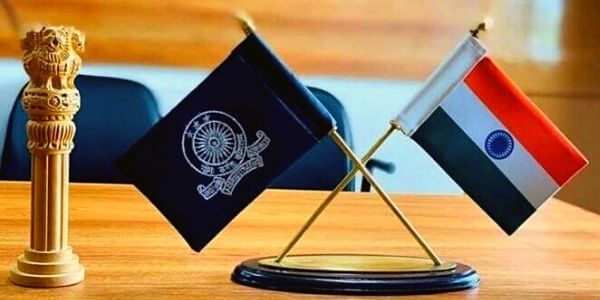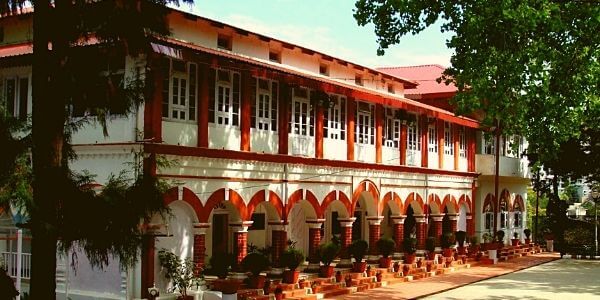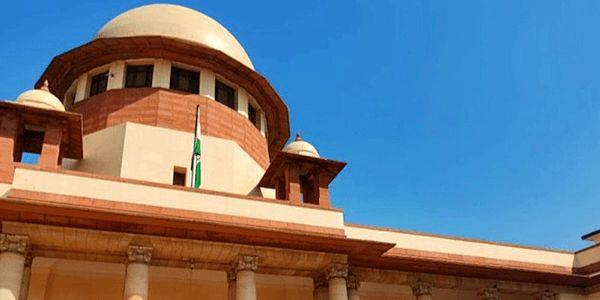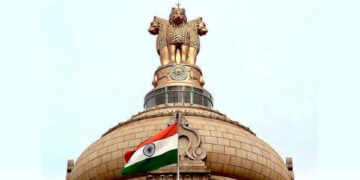Every year, thousands of aspirants apply for the UPSC exam, but only a few hundred are chosen and assigned to the services. Officers are assigned to these services based on their rank, reserved category, and the number of openings available in that current year. We’ve covered the UPSC candidate cadre allocation service list’s last rank for IAS, IPS, or IFS, as well as how IAS cadre allocation works and other essential details in this article. So let’s begin.
What is a Cadre (IAS Cadre Allocation)?
A state (or group of states/union territories) to which an officer of an All India Service such as the IAS or IPS may be appointed is referred to as a cadre. UP cadre, Kerala cadre, Bihar cadre, and others are examples. Unless he opts for central government deputation – where he works at the Centre – an IAS/IPS officer usually serves in his assigned cadre (state) for the duration of his service.
The Department of Personnel & Training (DoPT) of the Govt of India assigns a cadre to a candidate. The cadre allocation is based on the candidate’s rank, cadre preference, and available positions. Also, This material would be very useful to aspirants studying for the IAS Exam. Before applying for your examination, it is also necessary to understand the differences between UPSC and PSC.To learn more, go here. Also, Now let us talk about Cadre Allocation Policy for IAS | IPS | IFOS (UPSC)

Cadre Allocation Policy for IAS | IPS | IFOS (UPSC)
Firstly The Government of India declared in January 2019 that the state cadre of ‘Jammu & Kashmir’ would be eliminated, amending the Cadre Allocation Policy (CAP) 2017. Secondly, It was previously amended in 2017 for the All India Services – IAS, IPS, and IFoS – and was implemented beginning with the UPSC 2017 test. Therefore, there are significant distinctions between the current UPSC (IAS) Cadre Allocation Policy and the previous cadre allocation policy. Finally For UPSC 2022, the same policy will apply.
Five Zones IAS Cadre Allocation (List) Policy
State cadres (IAS Cadre Allocation List) have been divided into five zones:
| State Cadres for UPSC – All India Services | |
| Zones | State Cadres |
| Zone-I | AGMUT, Himachal Pradesh, Uttarakhand, Punjab, Rajasthan & Haryana |
| Zone-II | Uttar Pradesh,Jharkhand, Odisha, Bihar. |
| Zone-III | Gujarat, Maharashtra, Madhya Pradesh, Chattisgarh |
| Zone-IV | West Bengal, Assam, Sikkim, Meghalaya, Manipur, Nagaland, Tripura |
| Zone-V | Telangana, Andhra Pradesh, Karnataka, Tamil Nadu, Kerala |
Objectives of the New Policy IAS Cadre Allocation
The New IAS Cadre Allocation Policy aims to achieve three primary goals for the Government of India and state governments:
- Boost national integration
- Also, Rationalize vacancies based on IAS cadre strength.
- An Increase in administrative efficiency by redistributing officers from surplus to deficit states.
UPSC IAS Cadre Allocation Policy
The UPSC assigns IAS cadres Allocation according to the following procedure:
- The cadre governing authorities for the IAS (Department of Personnel and Training), IPS (Ministry of Home Affairs), & IFoS (Ministry of Environment, Forests, and Climate Change) should decide one’s respective vacancies, However In accordance with the rules established by them, including unreserved and reserved categories.
- The IAS Cadres are currently divided into five zones, as described in the article.
- Therefore Candidates should express their preference for UPSC Cadres in the following order:
- Zone of Preference
- Cultural preference
- In the order of preference, the process should be repeated for each Zone and Cadre.
- If the UPSC Candidate does not declare a preference for one or more UPSC cadres, Similarly it is presumed that they have no interest in that Zone or UPSC Cadre, and the following may occur.
- If there are adequate vacancies for instance, Based on their merit level, the candidate may be allocated to a zone & cadre that they have specified.
- Because the applicants have not been assigned to any of the cadres for which they stated a preference but, they will be placed in cadres with other candidates as follows:
- The cadre will be assigned based on the merit rating of the remaining candidates on the vacancies that exist after cadres have been assigned to other candidates who have declared their preferences.
- Also, For allotment purposes, the cadres will be sorted alphabetically.
Allocation Policy on merit
- Aspirants with physical disabilities can state their UPSC service Cadre allocation preference from any one state/cadre in their first chosen zone. However, The UPSC Home Cadre will be assigned based on merit, preference, and vacant positions. For IAS Cadre Allocation, candidates must specify their home zone and home cadre; else, they will be ineligible for the home cadre. After that, It is divided into three steps:
- Firstly, According to the category, insider posts are filled.
- Candidates qualified for the home cadre are sent to the UPSC cadre after filling the insider vacancies.
- Outsider positions will be filled next.
- Therefore, Depending on his merit and desire, a reserved category applicant accepted on general merit may be allocated to an unreserved post. If an unreserved opening for their first choice is not available, they will be assigned a UPSC Cadre from the reserved pool based on merit, availability, and preference.
- For IAS officers participating in the Foundation Course at LBSNAA, it is completed prior to the start of training, and for IPS and IFoS, as soon as appointments are made.
Although the UPSC (IAS) Service Cadre Allocation Policy looks to be difficult, applicants are only contacted when they express an interest. Because the governing authorities do not accept changes in preference after the application has been completed, the choice of an IAS cadre and zone (Allocation) should be made carefully. Furthermore, if a candidate does not express even one preference, their cadre assignment is done last, which means that even if the applicant has a high merit score, they may not be assigned to the desired cadre.

Year – Wise Allocation for IAS, IPS, and IFS Cadre
The UPSC assigns departments based on the Civil Service rank list of the candidates for that year. In other words, We present a relative analysis to give you a clear image of the cut-off rankings, rank wise posts in UPSC, IAS rank wise posts, IPS, or IFS. For the last three years, candidates can find the final ranks for these three important services (IAS, IPS, and IFS) in the categories of General, OBC, SC, and ST (2018-2020).
Final Ranks Allocation for IAS, IPS, and IFS in 2020 Cadre (UPSC Rank-by-Post – 2020)
A total of 761 candidates for civil service appointments have been suggested. The following is a summary of the total number of applicants for each job:
| Services | Number of Candidates From Each Category |
| IAS | General – 72 EWS – 18 OBC – 49 SC – 28 ST – 13 Total – 180 |
| I.F.S | General – 15 EWS – 03 OBC – 10 SC – 05 ST – 03 Total – 36 |
| IPS | General – 80 EWS – 20 OBC – 55 SC – 30 ST – 15 Total – 200 |
| Central Services Group ‘A’ | General – 118 EWS – 34 OBC – 84 SC – 43 ST – 23 Total – 302 |
| Group ‘B’ Services | General – 53 EWS – 11 OBC – 31 SC – 16 ST – 07 Total – 118 |
Final Ranks for IAS, IPS, and IFS in 2019 (UPSC Rank-by-Rank Post – 2019)
A total of 829 individuals have been recommended for Civil Service appointments from various categories. Therefore, The following is a summary of the total numbers against each post:
| Services | Number of Candidates From Each Category |
| IAS | General – 72 EWS – 18 OBC – 52 SC – 25 ST – 13 Total – 180 |
| I.F.S | General – 12 EWS – 2 OBC – 6 SC – 3 ST – 1 Total – 24 |
| IPS | General – 60 EWS – 15 OBC – 42 SC – 23 ST – 10 Total – 150 |
| Central Services Group ‘A’ | General – 196 EWS – 34 OBC – 109 SC – 64 ST – 35 Total – 438 |
| Group ‘B’ Services | General – 57 EWS – 14 OBC – 42 SC – 14 ST – 8 Total – 135 |
Final Ranks for IAS, IPS, and IFS in 2018 (UPSC Rank-by-Post – 2018)
In addition, The following is a list of the 812 applicants who have been recommended for appointment in various categories:
| Services | Number of Candidates From Each Category |
| IAS | General – 91 OBC- 48 SC – 27 ST – 14 Total – 180 |
| I.F.S | General – 15 OBC – 09 SC – 05 ST – 01 Total – 30 |
| IPS | General – 75 OBC – 42 SC – 24 ST – 09 Total – 150 |
| Central Services Group ‘A’ | General – 198 OBC – 98 SC – 57 ST – 31 Total – 384 |
| Group ‘B’ Services | General – 35 OBC – 12 SC – 15 ST – 06 Total – 68 |
Also, Candidates are trained for IAS at LBSNAA, Mussoorie, after being selected in the UPSC Exam. Furthermore, now you must be clear about how IAS Cadre Allocation is done and their policies

Conclusion
In Conclusion, This article will provide you with everything you need to know about the UPSC candidate cadre allocation service list’s last rank for IAS, IPS, or IFS, as well as how cadre allocation works and other important aspects. Also, Candidates who study hard for the Civil Services Exam and remain focused throughout the IAS Online Application process will be allotted to the position of their choice. Therefore, read this article properly to give you a clear picture of allocation, rank, and other details.
FAQ- IAS Cadre Allocation
Allocation of IAS Cadre and IPS (UPSC) Service List – The cadre will be assigned based on the merit rating of the remaining candidates on the vacancies that exist after cadres have been assigned to other candidates who have declared their preference. As a result, the cadres will be sorted alphabetically for allotment purposes.
The Department of Personnel and Training of the Government of India has separated the existing 26 cadres into five zones in the new policy. In addition, According to the new policy, an applicant must first select a Zone in descending order of preference from among the several Zones.
It is also the cadre controlling authority for the Arunachal Pradesh-Goa-Mizoram & Union Territory (AGMUT) cadre of the Indian Administrative Service (IAS)/Indian Police Service (IPS), as well as the Delhi-Andaman and Nicobar Island Civil Service (DANICS)/Delhi-Andaman and Nicobar Island Police Service.

Editor’s Note | IAS Cadre Allocation
In conclusion, the above article covers everything you need to know about the UPSC candidate cadre allocation service list’s last rank for IAS, IPS, or IFS, as well as how cadre allocation works and other key points. Also, The UPSC exam is not easy. It necessitates a great deal of focus, hard work, and dedication. Furthermore , Those who combine these characteristics, on the other hand, find it easy to break. In addition, You should also study over the past year’s question papers to learn and master the different types of questions, as well as the additional marks requirements and time limits for each question. Lastly, we wish you all the best.







